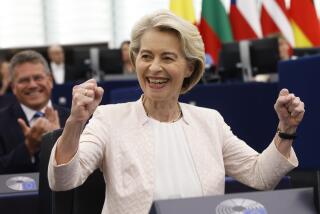Czechs Get New President at Last
- Share via
PRAGUE, Czech Republic — Lawmakers elected former Prime Minister Vaclav Klaus on Friday to succeed his longtime rival, Vaclav Havel, as Czech president.
Klaus won a drawn-out struggle for the presidency in part through an effort to change his image from an abrasive and arrogant right-winger to a statesman determined to listen to all views and represent all citizens. Many Communist members of Parliament who once bitterly opposed him gave him their votes, as did a significant number of lawmakers from the ruling Social Democratic Party. Klaus belongs to the Civic Democratic Party.
After his razor-thin victory, with 142 votes in the 281-member Parliament, Klaus, 61, pledged to tread softly in the high-profile but largely ceremonial post. But he could not resist a dig at the playwright and former dissident he will replace.
“I would be very much against an activist role for the president, which was characteristic for the past period of Vaclav Havel,” Klaus said.
Klaus acknowledged, however, that Havel’s contributions to his nation “cannot be doubted, especially in foreign policy.”
Through the force of his personality and the moral stature gained from his dissident struggles, Havel was a major figure on the world stage -- giving his country a voice it might not otherwise have had.
“I hope I will be a dignified president,” Klaus added. “I also want to assure the citizens of the Czech Republic that in this post, I’m prepared not to disappoint any among the 10 million” people of the nation.
Jan Sokol, a former education minister who was the ruling coalition’s candidate, received 124 votes. One lawmaker was absent, and 14 abstained.
The day’s balloting marked the Parliament’s third attempt to elect a president. None of the candidates gained a majority in the two previous votes, in January. Havel’s second term ended Feb. 2, and he was ineligible to run again.
Klaus’ election was a blow to the government of the current prime minister, Vladimir Spidla. And the Communists’ key role in Klaus’ victory marked a partial return to respectability for them.
Unlike many former Communist parties in Eastern Europe, which have changed their names and become social democratic parties since the revolutions of 1989, the Czech Communists retain an image of being largely unreformed. As a result, they have been ostracized by all mainstream parties.
But now “the Communists are halfway out of isolation,” said Petr Novacek, a prominent political commentator. “What will they get for it? Nothing?”
Instead of uniting behind a single candidate, the Social Democrats split their vote in all three efforts by Parliament to elect a president. The party had been “shaken by foolishness,” Novacek said. “It is a step toward political suicide.”
Spidla denied that the election of Klaus was a severe setback for the ruling party.
“We have not managed to get total unity, but that happens,” he said after the final vote. “It’s simply the problem of an unsuccessful election.... The candidate of the coalition was not elected.”
Not all political observers take the new, kinder, gentler Klaus at face value.
“Now, full of wonder, we are finding for several weeks what a smiling, kind and friendly man he is, what a good mood he spreads, how he is pleasant, charming, lovable and always willing to listen with attention to everybody,” the daily newspaper Pravo said sarcastically.
Klaus -- widely credited with being key to both the successes and the shortcomings of his country’s economic transition from communism -- will be inaugurated for a five-year term next Friday during a joint session of Parliament.
Martin Hekrdla, writing in Friday’s Pravo, alluded to Klaus’ reputation as a skeptic about European unity but predicted that his election would neither present a barrier to the country’s expected entry into the European Union next year nor cripple the country’s political left.
“If today, Vaclav Klaus is elected, because of that the bells will not toll for the European Union, and this state will not be flooded for a whole generation by the extreme right,” he wrote. “We are behaving as if we were electing a real sovereign, but that is something none of our presidents ever was or ever will be.”
*
Times staff writer Holley reported from Moscow and special correspondent Drapalova reported from Prague.
More to Read
Sign up for Essential California
The most important California stories and recommendations in your inbox every morning.
You may occasionally receive promotional content from the Los Angeles Times.













